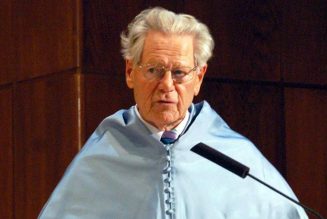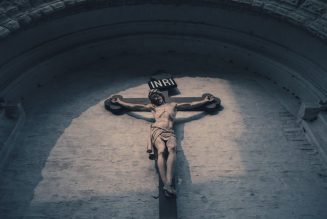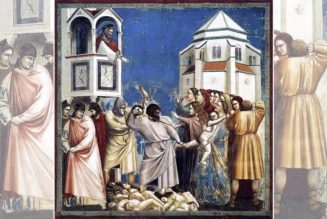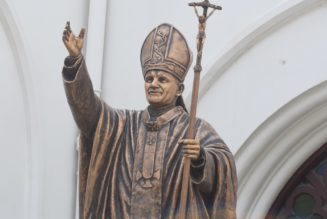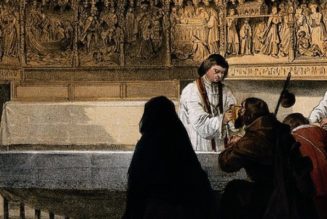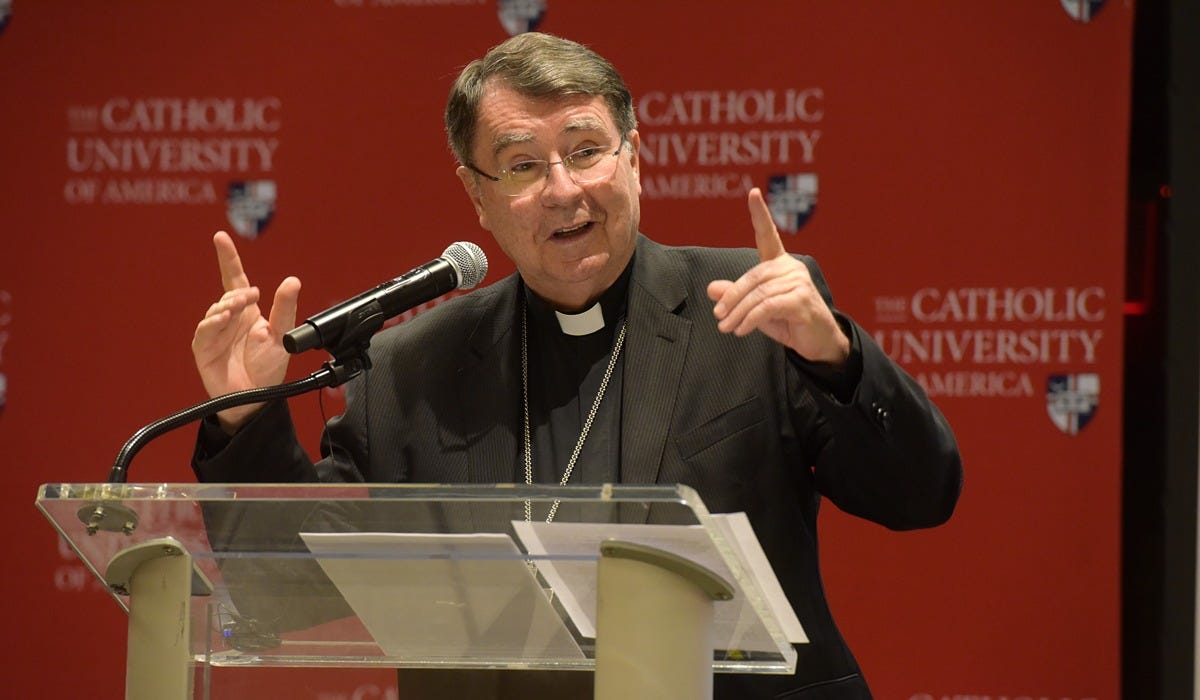
When Archbishop Timothy Broglio began on Tuesday morning his USCCB presidential address on the state of the Church in the U.S., he quoted from scripture, urging that “whoever has ears ought to hear what the Spirit says to the Churches.”
To most of those with ears to hear, it seems clear that Broglio was talking to U.S. apostolic nuncio Cardinal Christophe Pierre — offering a pointed rebuke of Pierre’s recent comments on American Catholics and their leaders, given in an interview with America magazine.
Broglio’s speech, accompanied by frequent and vigorous nods from the assembly of bishops, appeared to be intended as both apologia for the Church in the United States and a kind of episcopal catharsis, for a body stung by criticism from Pierre, compounded by episcopal unease over the manner by which Bishop Joseph Strickland was recently removed from office.
Broglio’s thinly veiled rebuke seems to show Pierre has isolated himself from the American bishops to whom he’s supposed to serve as the pope’s emissary. It is well-known in the Vatican and in U.S. Church circles that Pierre is regularly at odds with U.S. Cardinals Blase Cupich and Robert McElroy, especially as he aims to normalize the channels of information and decision-making between Rome and the U.S. Church — channels which would typically flow through his office, but which are frequently sidestepped by Cupich.
Bishops outside of the Cupich camp have tended to be sympathetic to Pierre, and to support his leadership, even if he is not always in theological lockstep with them. His defenders are often those who say he takes the time to listen to them, to visit their dioceses, and to concern himself with their problems.
But his America magazine interview was offensive to many of those same bishops, leaving Pierre with a diminishing number of supporters among the American bishops.
Worse, the cardinal’s comments have created an impression among many American bishops that they and the dioceses they lead are neither understood or much liked by Rome’s man in Washington.
For Pierre, that could ironically leave him less effective as a nuncio, and more isolated in his role, just as he should be celebrating his newly minted status as a cardinal.
—
Since his arrival as apostolic nuncio in Washington DC, Pierre has made it his business to speak frankly to the U.S. bishops.
The cardinal’s speeches at the opening public sessions of the USCCB’s spring and autumn assemblies have become known for the gently corrective tone with which Pierre usually delivers frank but fraternal encouragement for the U.S. bishops, usually on some point of papal priority.
Previous conferences have seen the nuncio offer pointed observations on synodality, lay co-responsibility, the principle of “gradualness” and the pastoral application of papal documents like Amoris laetitia and Mitis iudex dominus Iesus.
The nuncio, who was made a cardinal in September, has always been careful to sugar his pills for the bishops, and to phrase his admonishments as invitations for episcopal reflection.
In response, Pierre has usually been afforded a warm and respectful welcome by the U.S. bishops, and a generally positive disposition to the cardinal even in private.
But this year in Baltimore, there is a markedly more frosty reception for Cardinal Pierre.
While the conference president, Archbishop Timothy Broglio, offered the customary thanks to the nuncio, and “heartfelt” congratulations on his elevation to the College of Cardinals, the mood among the bishops was decidedly less sanguine than it has been, and Broglio offered a speech that seemed meant obviously to contradict Pierre’s recent assessment of the Church in the U.S.
—
In an America magazine interview earlier this month, Pierre lamented that the Church in the U.S. does not reflect the apostolic vigor he sees in South and Central America, and said that the U.S. Church has much to learn on evangelization.
Speaking of the U.S, Pierre said that “over 200 years, we have built fantastic church schools, hospitals, parishes, and churches. But almost nobody comes,” he said. “Pope Francis said, ‘Go out of the church.’ But we still remain in the church. Why?”
Pierre went on to say he is “not sure” he’s seen any real change in the Church in the United States during his tenure, though society has changed a great deal.
As a result, the cardinal claimed that “some priests and religious and bishops […] are terribly against Francis, as if he was the scapegoat for all the failures of the Church or of society.”
Pierre lamented that “most of the young priests today dream about wearing the cassock and celebrating Mass in the traditional [pre-Vatican II] way,” and accused them of shying away from the work of evangelization, seeking comfort and security in an institutionalist approach to the Church and her liturgy.
As for the bishops, the cardinal said “I think all of them, in some way, feel they have to evangelize, but they don’t always find the ways to do so.” Instead, Pierre said he sees them as timid and prisoners of their advisors.
As assessments go, it was withering.
The interview was published more than a week ago. But Pierre’s words were still echoing around the conference as the bishops began arriving in Baltimore over the weekend.
Several bishops told The Pillar that they were stung by the cardinal’s words, and the picture he painted of the Church in the United States. Some said the interview was ill-judged, and unfair to them.
And bishops especially took umbrage on behalf of their priests.
Seeming to dismiss “most young priests” in the U.S. as backward-looking institutionalists — afraid to get their hands dirty with pastoral work — was, bishops have privately said, poor form by the nuncio — especially at a time when those same priests are reporting high levels of burnout, trying to cover multiple parish assignments and bearing the brunt of criticism of the Church in the face of scandals.
—
When Broglio began speaking Tuesday, it was clear that his remarks were meant to offer a counter-propostion.
While offering the customary words of welcome and thanks to Cardinal Pierre on Tuesday, he soon began a barely coded deconstruction of Pierre’s vision of the Church in the United States.
He began by praising “the many synodal realities that already exist in the Church in the United States.”
“The collegial atmosphere that characterizes these assemblies, the excellent consideration and interaction that typifies the work of the National Advisory Council, the work of diocesan pastoral councils, presbyteral councils, review boards, school board and so many other organizations come readily to mind,” Broglio said.
“That is not to say that we do not have to grow and open ourselves to new possibilities,” the archbishop said, “but we recognize and build on what is already present. We open our hearts to the action of the Holy Spirit and we listen to that voice.”
After breaking to discuss war torn areas of the world and express the conference’s solidarity with the persecuted Church in places like Nicaragua, Broglio resumed his theme of existing realities in the U.S. and the ongoing work of evangelization in cooperation with lay-led ministries.
Later in the speech, Broglio praised American priests as “on the front lines of these efforts” and “on fire with the Gospel,” and American seminarians as “committed to knowing the Lord more deeply,” “men for others,” and “a sign of hope for the future.”
“Whoever has ears ought to hear what the Spirit says to the Churches,” Broglio concluded, just as he had begun. If his point was lost on anyone in or outside the conference hall, the archbishop clarified further in a press gaggle.
Asked if he recognized Cardinal Pierre’s America magazine depiction of the Church in the United States, Broglio responded simply: “No.”
“At least the way America magazine characterized Archbishop Pierre’s reflections, I don’t think that really reflects the Church in the United States.”
“Our churches are not empty — yet,” Broglio said. “We’re trying our best to make sure that continues to be the case. We have a number of seminaries that are actually at capacity. I think there’s been a concerted effort both for the Eucharistic Revival and for the notion of preaching the Good News.”
Allowing that Cardinal Pierre is entitled to his own opinion, the archbishop said he and the nuncio had spoken about his comments in America.
What exactly he and Pierre might have said to each other, Broglio didn’t repeat.
—
Of course, Pierre was still afforded every courtesy by the conference on Tuesday, and there’s no suggestion that his criticisms have made it impossible to do his job. The risk, rather, seems to be that the cardinal will now be viewed as a man apart from the bishops he has to work with every day — and that could limit his effectiveness.
In his own speech to the conference Tuesday, the nuncio did not allude to his recent criticisms of the American bishops and their clergy, but appeared to offer a “business as usual” address in his customary tone and style, calling on the bishops to reflect on how their Eucharistic revival relates and finds meaning in the ecclesiology of synodality.
While that speech was met with the customary polite attention and warm reception, though, speaking to bishops in Baltimore, many now seem jaded about Pierre’s fraternal overtures, having heard what he seems to really think about them.
The challenge for Pierre now is winning back the trust and good will he needs in his role. For that, he’ll have to work fast.
The 77-year-old cardinal is already serving past the customary retirement age, clearly trusted by Pope Francis to be his man in America. But, if Pierre wants to make the most of his remaining time in the job, many bishops will need convincing that he does actually value and respect them, their priests and the Catholic communities they lead.
Without that convincing, he — and they — may simply find themselves waiting for the pope to make an eventual and inevitable change at the apostolic nunciature.
Comments 51
Services Marketplace – Listings, Bookings & Reviews

